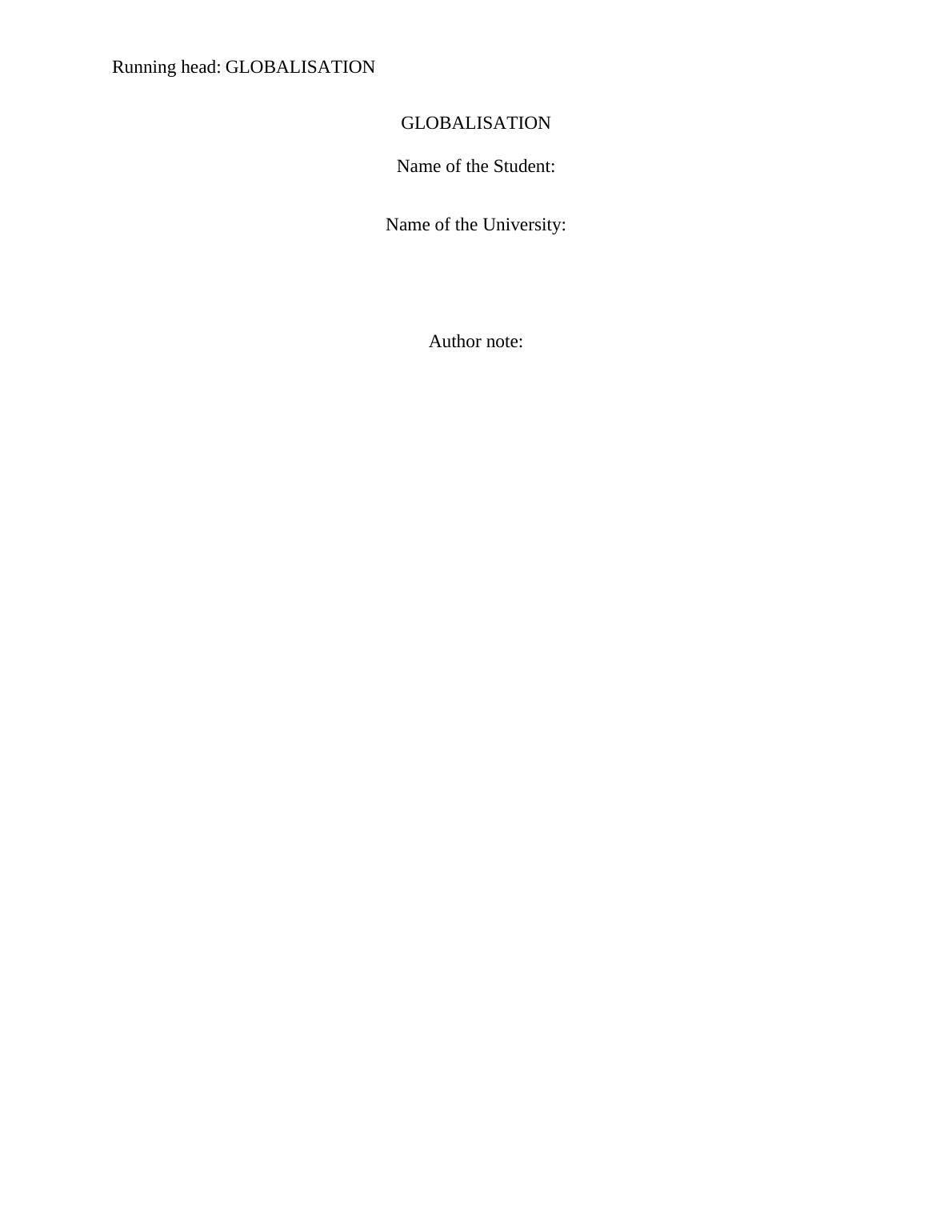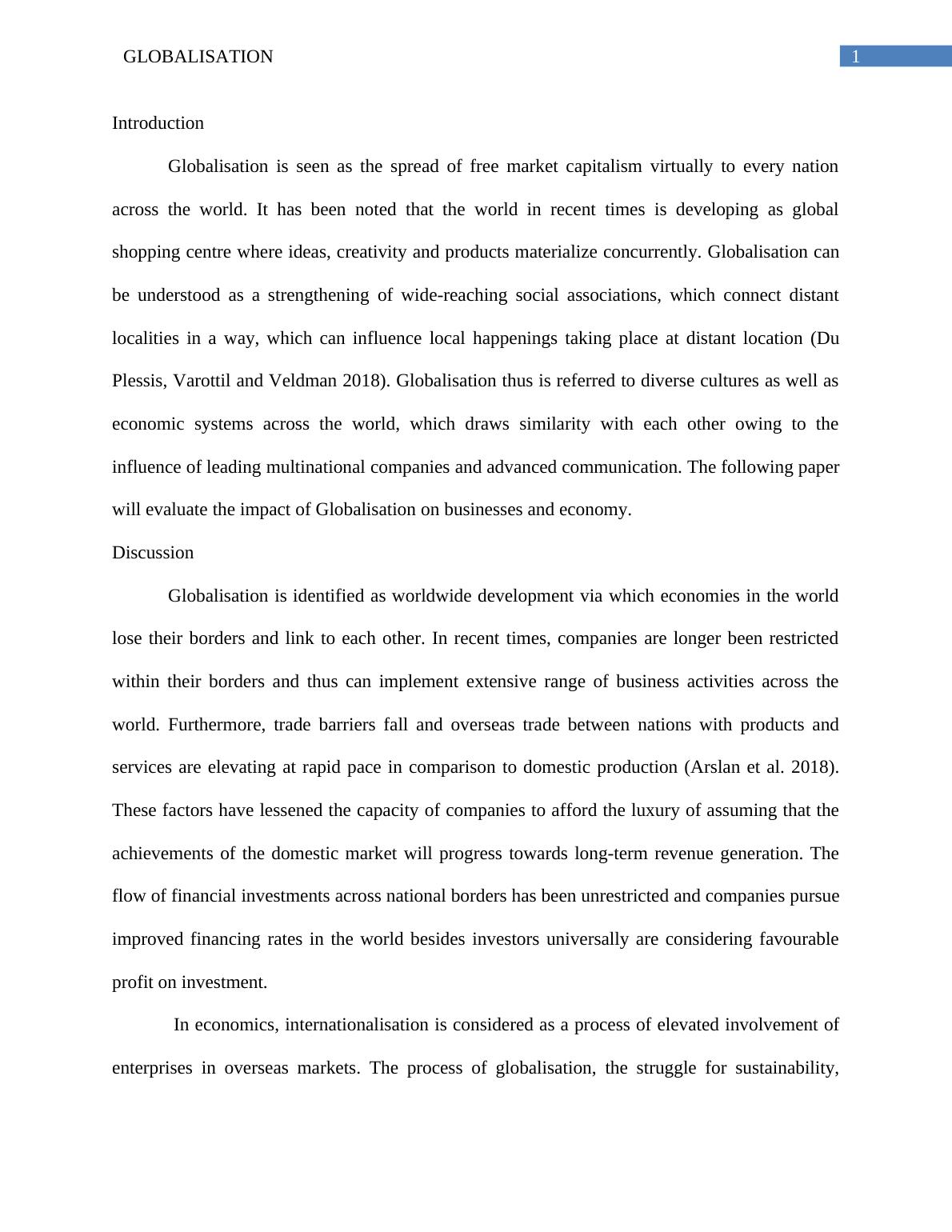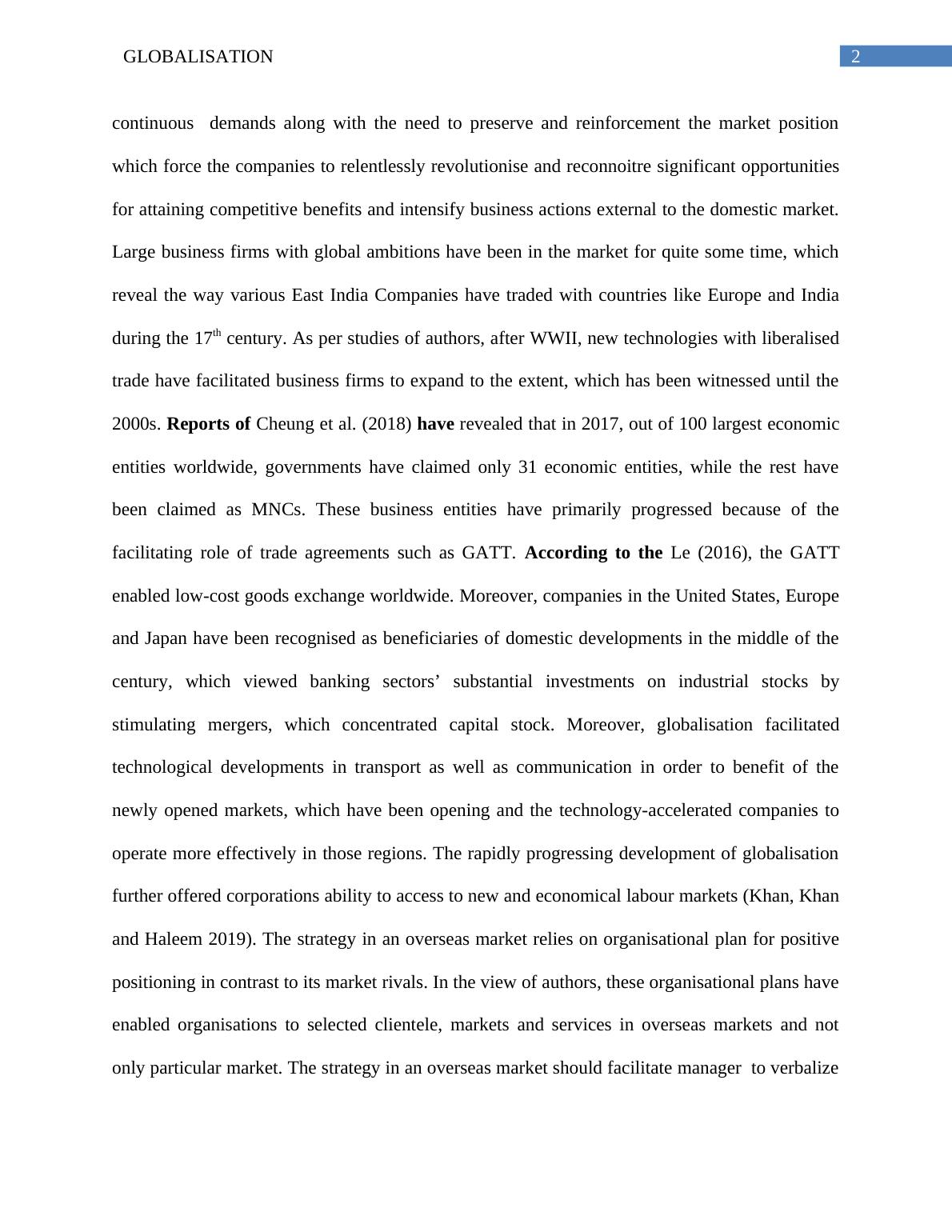Impact of Globalisation on Businesses and Economy
Added on 2022-11-07
6 Pages1422 Words114 Views
Running head: GLOBALISATION
GLOBALISATION
Name of the Student:
Name of the University:
Author note:
GLOBALISATION
Name of the Student:
Name of the University:
Author note:

GLOBALISATION1
Introduction
Globalisation is seen as the spread of free market capitalism virtually to every nation
across the world. It has been noted that the world in recent times is developing as global
shopping centre where ideas, creativity and products materialize concurrently. Globalisation can
be understood as a strengthening of wide-reaching social associations, which connect distant
localities in a way, which can influence local happenings taking place at distant location (Du
Plessis, Varottil and Veldman 2018). Globalisation thus is referred to diverse cultures as well as
economic systems across the world, which draws similarity with each other owing to the
influence of leading multinational companies and advanced communication. The following paper
will evaluate the impact of Globalisation on businesses and economy.
Discussion
Globalisation is identified as worldwide development via which economies in the world
lose their borders and link to each other. In recent times, companies are longer been restricted
within their borders and thus can implement extensive range of business activities across the
world. Furthermore, trade barriers fall and overseas trade between nations with products and
services are elevating at rapid pace in comparison to domestic production (Arslan et al. 2018).
These factors have lessened the capacity of companies to afford the luxury of assuming that the
achievements of the domestic market will progress towards long-term revenue generation. The
flow of financial investments across national borders has been unrestricted and companies pursue
improved financing rates in the world besides investors universally are considering favourable
profit on investment.
In economics, internationalisation is considered as a process of elevated involvement of
enterprises in overseas markets. The process of globalisation, the struggle for sustainability,
Introduction
Globalisation is seen as the spread of free market capitalism virtually to every nation
across the world. It has been noted that the world in recent times is developing as global
shopping centre where ideas, creativity and products materialize concurrently. Globalisation can
be understood as a strengthening of wide-reaching social associations, which connect distant
localities in a way, which can influence local happenings taking place at distant location (Du
Plessis, Varottil and Veldman 2018). Globalisation thus is referred to diverse cultures as well as
economic systems across the world, which draws similarity with each other owing to the
influence of leading multinational companies and advanced communication. The following paper
will evaluate the impact of Globalisation on businesses and economy.
Discussion
Globalisation is identified as worldwide development via which economies in the world
lose their borders and link to each other. In recent times, companies are longer been restricted
within their borders and thus can implement extensive range of business activities across the
world. Furthermore, trade barriers fall and overseas trade between nations with products and
services are elevating at rapid pace in comparison to domestic production (Arslan et al. 2018).
These factors have lessened the capacity of companies to afford the luxury of assuming that the
achievements of the domestic market will progress towards long-term revenue generation. The
flow of financial investments across national borders has been unrestricted and companies pursue
improved financing rates in the world besides investors universally are considering favourable
profit on investment.
In economics, internationalisation is considered as a process of elevated involvement of
enterprises in overseas markets. The process of globalisation, the struggle for sustainability,

GLOBALISATION2
continuous demands along with the need to preserve and reinforcement the market position
which force the companies to relentlessly revolutionise and reconnoitre significant opportunities
for attaining competitive benefits and intensify business actions external to the domestic market.
Large business firms with global ambitions have been in the market for quite some time, which
reveal the way various East India Companies have traded with countries like Europe and India
during the 17th century. As per studies of authors, after WWII, new technologies with liberalised
trade have facilitated business firms to expand to the extent, which has been witnessed until the
2000s. Reports of Cheung et al. (2018) have revealed that in 2017, out of 100 largest economic
entities worldwide, governments have claimed only 31 economic entities, while the rest have
been claimed as MNCs. These business entities have primarily progressed because of the
facilitating role of trade agreements such as GATT. According to the Le (2016), the GATT
enabled low-cost goods exchange worldwide. Moreover, companies in the United States, Europe
and Japan have been recognised as beneficiaries of domestic developments in the middle of the
century, which viewed banking sectors’ substantial investments on industrial stocks by
stimulating mergers, which concentrated capital stock. Moreover, globalisation facilitated
technological developments in transport as well as communication in order to benefit of the
newly opened markets, which have been opening and the technology-accelerated companies to
operate more effectively in those regions. The rapidly progressing development of globalisation
further offered corporations ability to access to new and economical labour markets (Khan, Khan
and Haleem 2019). The strategy in an overseas market relies on organisational plan for positive
positioning in contrast to its market rivals. In the view of authors, these organisational plans have
enabled organisations to selected clientele, markets and services in overseas markets and not
only particular market. The strategy in an overseas market should facilitate manager to verbalize
continuous demands along with the need to preserve and reinforcement the market position
which force the companies to relentlessly revolutionise and reconnoitre significant opportunities
for attaining competitive benefits and intensify business actions external to the domestic market.
Large business firms with global ambitions have been in the market for quite some time, which
reveal the way various East India Companies have traded with countries like Europe and India
during the 17th century. As per studies of authors, after WWII, new technologies with liberalised
trade have facilitated business firms to expand to the extent, which has been witnessed until the
2000s. Reports of Cheung et al. (2018) have revealed that in 2017, out of 100 largest economic
entities worldwide, governments have claimed only 31 economic entities, while the rest have
been claimed as MNCs. These business entities have primarily progressed because of the
facilitating role of trade agreements such as GATT. According to the Le (2016), the GATT
enabled low-cost goods exchange worldwide. Moreover, companies in the United States, Europe
and Japan have been recognised as beneficiaries of domestic developments in the middle of the
century, which viewed banking sectors’ substantial investments on industrial stocks by
stimulating mergers, which concentrated capital stock. Moreover, globalisation facilitated
technological developments in transport as well as communication in order to benefit of the
newly opened markets, which have been opening and the technology-accelerated companies to
operate more effectively in those regions. The rapidly progressing development of globalisation
further offered corporations ability to access to new and economical labour markets (Khan, Khan
and Haleem 2019). The strategy in an overseas market relies on organisational plan for positive
positioning in contrast to its market rivals. In the view of authors, these organisational plans have
enabled organisations to selected clientele, markets and services in overseas markets and not
only particular market. The strategy in an overseas market should facilitate manager to verbalize

End of preview
Want to access all the pages? Upload your documents or become a member.
Related Documents
Evaluation of Challenges a Mnc Faces Due to Globalisationlg...
|9
|2590
|66
Unit 18 Global Business Environment : Assignmentlg...
|31
|1377
|129
Benefits and Barriers of International Businesslg...
|1
|1315
|83
Analysis of Globalisation Drivers for Oneplus and its Strategy in Indialg...
|11
|2845
|35
International Trade Finance and Investmentlg...
|17
|5006
|4
International Trade and Globalization: Implications and Shifts in the World Economy, with a Focus on New Zealandlg...
|11
|2851
|129
